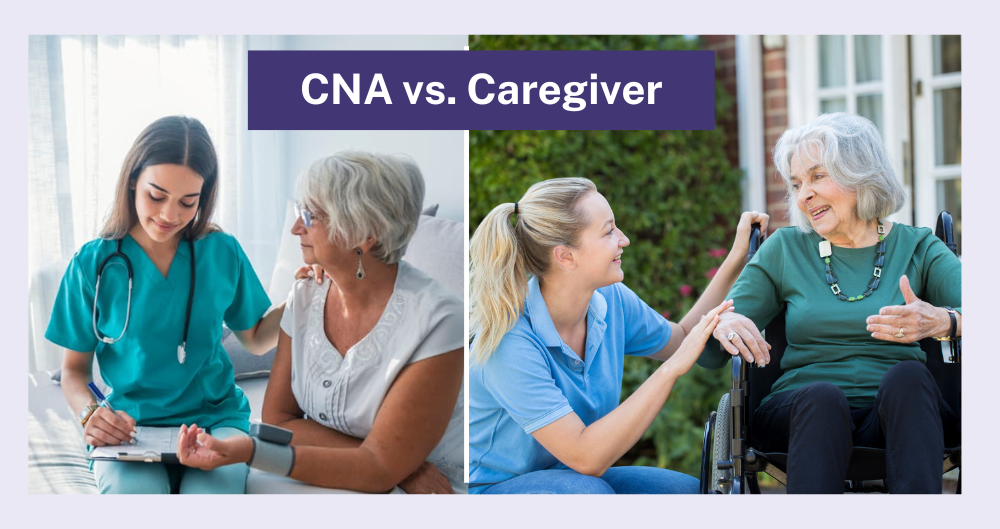Job roles and responsibilities
CNAs can perform medical tasks and have a license to assist with primary medical care, which is the main distinction. They offer companionship to their patients and may help in housekeeping similarly to caregivers. On the other hand, Caregivers can help with housework and companionship but can’t perform direct medical tasks. They may provide support to patients who need memory care, but they can’t provide any medical services. Check out the list below to understand more about their scope of work.
Caregiver Responsibilities:
-
Assist with Daily Activities, including bathing, grooming, feeding, and more.
-
Manage patients' personal schedules and run errands for them.
-
Perform light housekeeping tasks such as sweeping, laundry, and dishes.
-
Safely lift, transfer, and aid patients with mobility issues.
-
Document and monitor food intake and nutritional content.
-
Provide information and support to patients' families, reporting health progress or decline.
-
Engage in recreational activities and support patients' hobbies.
-
Assist with tasks like writing letters, paying bills, and managing calendars.
-
Offer companionship and communication to make patients feel heard and cared for.
-
Assist patients with their toilet and restroom needs.
CNA Responsibilities:
-
Assist with Daily Activities, including bathing, grooming, feeding, and more.
-
Manage patients' personal schedules and run errands for them.
-
Perform light housekeeping tasks such as sweeping, laundry, and dishes.
-
Safely lift, transfer, and aid patients with mobility problems.
-
Administer medications to residents in care facilities.
-
Measure and record weight, temperature, blood pressure, pulse, respiration, and urinary output.
-
Document and monitor food intake and nutritional content.
-
Assist with setting up, using, and maintaining medical equipment as needed.
-
Collaborate with healthcare professionals as part of a multidisciplinary team.
-
Provide information and support to patients' families, reporting health progress or decline.
-
Engage in recreational activities and support patients' hobbies.
-
Assist with tasks like writing letters, paying bills, and managing calendars.
-
Offer companionship and communication to make patients feel heard and cared for.
-
Assist patients with their toilet and restroom needs.
Education and certification process
Most of the time, there are no required degrees or certificates to be a caregiver. Though sometimes, employers might look for a high school diploma or an equivalent. You may need to undergo training that fulfills the requirements of your state. If you wish to provide memory care to patients with dementia or Alzheimers, you must get specialized training for that too.
Depending on your state, they run background checks and require specific training hours to be eligible to work. Only 19 states do not require special training to be a caregiver, whereas the other 31 do. For example, to be a caregiver in New York, you have to complete 40 hours of training approved by the Department of Health (DOH). Check your state’s caregiver training requirements to learn more.
To become a CNA, each state has its own criteria and training requirements as well. You must complete training from an accredited school and render the required minimum hours of training for both theoretical and practical parts. After that, you must pass the CNA competency exam or the National Nurse Aide Assessment Program (NNAAP).
Training to be a CNA can be longer than caregiving training. This is because CNAs need to have specialized training to assist with medical care. Dreambound has already done the hard work of writing informative blogs with guidelines on becoming a CNA in certain states. Check them out to view the steps for earning a Nursing Aide certification in your location.
Job Outlook
Most Caregivers work in a patient's home, providing personal care and assistance with the upkeep of their home. You can also find them in assisted living facilities or specialized care settings like adult day cares, rehab centers, and more. According to BLS, this career projects a 25% growth in the next decade. That’s about 711,700 job openings every year!
As of May 2021, their mean annual salary is $29,430 or $14.15/ hr. The top-paying states for this profession in 2021 are:
-
North Dakota ($34,020)
-
Vermont ($33,810)
-
South Dakota ($27,810)
-
Idaho ($27,800), and
-
Kentucky ($27,310).
CNAs mostly work in nursing and residential care facilities and in hospitals. The overall employment for CNAs projects at least 5% growth from 2021 to 2031. This mirrors about 220,200 job openings for CNAs each year.
As of May 2021, their mean annual salary is $30,290 or $14.56/hr. Top paying states for this profession are:
-
Alaska ($20.71/hr; Annual rate: $43,080)
-
New York ($19.56/hr; Annual rate: $40,680)
-
California ($19.12/hr; Annual rate: $39,760)
-
District of Columbia ($18.94/hr; Annual rate: $39,390)
-
Oregon ($18.67/hr; Annual rate: $38,830)





